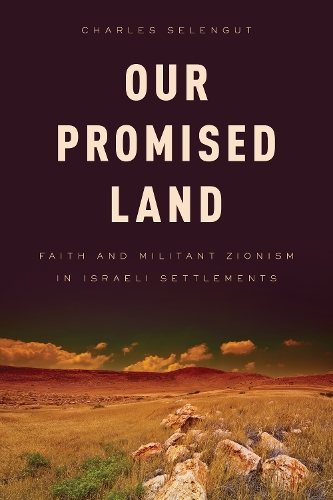
Our Promised Land: Faith and Militant Zionism in Israeli Settlements
(Hardback)
Publishing Details
Our Promised Land: Faith and Militant Zionism in Israeli Settlements
By (Author) Charles Selengut
Bloomsbury Publishing PLC
Rowman & Littlefield Publishers
6th August 2015
United States
Classifications
Professional and Scholarly
Non Fiction
Nationalism and nationalist ideologies and movements
320.54095694
Winner of Booklists Top 10 Religion and Spirituality Books.
Physical Properties
Hardback
202
Width 161mm, Height 236mm, Spine 20mm
449g
Description
Our Promised Land takes readers inside radical Israeli settlements to explore how they were formed, what the people in them believe, and their role in the Middle East today. Charles Selengut analyzes the emergence of the radical Israeli Messianic Zionist movement, which advocates Jewish settlement and sovereignty over the whole of biblical Israel as a religious obligation and as the means of world transformation. The movement has established scores of controversial settlements throughout the contested West Bank, bringing more than 300,000 Jews to the area. Messianic Zionism is a fundamentalist movement but wields considerable political power. Our Promised Land, which draws on years of research and interviews in these settlements, offers an intimate and nuanced look at Messianic Zionism, life in the settlements, connections with the worldwide Christian community, and the impact on the IsraeliPalestinian conflict. Selengut offers an in-depth exploration of a topic that is often mentioned in the headlines but little understood.
Reviews
Yeshaan acronym made up of the Hebrew initials of Judea, Samaria, and Gaza, the lands Israel wrested from Syria, Jordan, and Egypt in the 1967 Six-Day Waris also the name of the movement to reestablish Jewish control of all of biblical Israel by resettlement. Stereotyped as violent, intransigent fundamentalists, the people of Yesha, as sociologist Selengut, who has studied them for many years, demonstrates, show a broad range of ideas about how their bedrock conviction that Jews are duty-bound to occupy the land God gave them should be realized. Some are downright pacifist, while at the other extreme are settlers who practice eye-for-an-eye retaliation for attacks. In five long, sober chapters, Selengut reviews the rise of the settlements after the Six-Day War, the evolution of some Zionists into messianic nationalists, the culture and faith of settler communities, authoritative settlement figures, and the future of Yesha in the ongoing Middle East conflict. Selenguts dense, compact report is an invaluable resource for everyone studying modern Israel. * Booklist, Starred Review *
For knowledge of messianic Zionist discourse, this is the book to read. * Journal of Church and State *
Charles Selengut has turned his attention to the religious Zionist fundamentalist settlers who have made claims on what they view as their divinely promised Land of Israel and put their views and actions under his careful sociological lens. The result is a fascinating and highly informed account of these people whose beliefs and activities are rattling the Middle East. -- Samuel Heilman, distinguished professor of sociology, Harold M. Proshansky Chair of Jewish Studies, CUNY Queens College and The Graduate Center
This interesting and engaging book brings us inside the world and the world view of the militant Zionist settlers who see Palestinian territories as Jewish sacred land. It should be required reading for anyone concerned about the rise of religious activism around the world and about the prospects for peace in the Middle East. -- Mark Juergensmeyer, University of California, Santa Barbara
Our Promised Land is a must-read for experts in the field, yet it is also accessible and will be deeply educational to the millions with a stake in the issues discussed. Due to the near perfect combination of strengths Selengut brings to the task, this comprehensive and courageous book sheds light, grows understanding, and brings us further down the path to human betterment. -- Frank Kaufmann, international director, Inter-Religious Federation for World Peace
Author Bio
Charles Selengut is professor of sociology at Morris College and a former professor of religion at Drew University. He is the author of several books, including Sacred Fury: Understanding Religious Violence.
